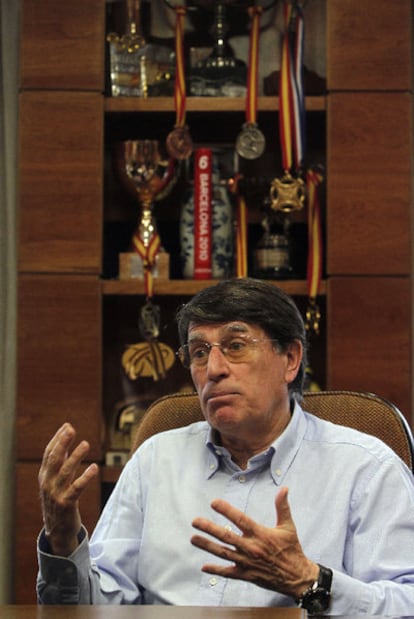"Operation Greyhound is good for athletics"
RFEA chief speaks out as extent of doping in Spanish athletics comes to light
Yesenia Centeno. Methandriol. Paquillo Fernández. Possession of banned substances. Tomás Sanchís. Cocaine. These are the Spanish athletes that are currently officially suspended by the International Athletics Federation for their links to doping.
It is also a cross-section of doping in Spanish track and field, from consecrated champions like Fernández to popular athletes such as Sanchís; young and old, taking in established long-distance runners like the Cuba-born Centeno. The blight of prohibited substances is not measured by status, origin or names.
These are the highest profile cases in Spain: José Luis Blanco, bronze 3,000m medalist at the 2010 European Championships, has a disciplinary investigation open against him for a positive EPO test; Josephine Onyia, the Nigeria-born sprint hurdler who arrived at the Beijing Olympics with a Spanish record time of 12.50 under her belt, the second-fastest worldwide of the 2008 season. She tested positive twice that year, for clenbuterol and methylhexaneamine. In November Onyia will be free to compete again. Fernández, Olympic silver-medal race-walker, who was banned for two years after the Civil Guard marched into his house and found substances that should not have been in the home of an athlete. He will be allowed to return to the roads in 2011.
"The CSD told me to wait. What can I do? Which heads shall I chop off first?"
Alberto García, who tested positive for EPO in 2003 when he was European 5,000m champion, was also implicated in Operation Greyhound, a Civil Guard investigation into a doping ring in Spanish athletics that led to 14 arrests last weekend. García was so fast he was dubbed "the Ethiopian"- but went from breaking records in 2001 to failing to qualify for the Olympic final in 2008. What leads some athletes down the path of doping?
"There are various types of athlete," wrote Sergio Sánchez, 3,000m indoor world silver medalist, in La Nación. "Those that arrive at a point in their careers, already going well, but who stagnate and think it is the time to turn to doping to continue improving. This can happen with mediocre athletes who might turn to doping for economic reasons. But it can also happen to top-level athletes. The other kind of athlete, among whom I include myself unreservedly, have remained unmoved in spite of seeing doping products passing in front of their eyes. It is very easy to enter a medical office with 5,000 euros and literally say: 'I have arrived at a point where I want to reach my peak. Use whatever you need to use, here are my veins. But make me a champion.'
"Then a doctor will ask a series of questions: 'Have you taken steroids? Have you taken EPO? Have you taken growth hormones? Have you taken IGF...' If you answer no to all, one of two things will happen. 1: the doctor will say he doesn't believe you reached that level without taking anything and will refuse to treat you. 2: the doctor will see a diamond in the rough and say 'kid, you can improve no end, with these things I'm going to give you you're going to explode.' That's when you need to have a cool head. How many athletes have made themselves ill and arrived at a point when they have to dope just to make a living? Thankfully these athletes have a short time in sports. When the punishments start to match the crime, they'll disappear."
Reacting to Operation Greyhound, Spanish Athletics Federation president José María Odriozola, told EL PAÍS this week. "If [doping] was as widespread as has been insinuated, it's extraordinary that it hasn't come to light before because secrets in this country are open ones. All those who have come out now to have their say... why did they say nothing to me? I am still adjusting to this and all I know is what the media says. I have to wait. The government's sports council [CSD] has told me to wait. What can I do? Which heads shall I chop off first? I am not hiding from this situation. They envy us abroad because of our stability. They see us in a better light abroad than at home because they understand what we do. Here in Spain, no. Although it hurts, Operation Greyhound is good for athletics. Everything that can clean up my sport is good."

Tu suscripción se está usando en otro dispositivo
¿Quieres añadir otro usuario a tu suscripción?
Si continúas leyendo en este dispositivo, no se podrá leer en el otro.
FlechaTu suscripción se está usando en otro dispositivo y solo puedes acceder a EL PAÍS desde un dispositivo a la vez.
Si quieres compartir tu cuenta, cambia tu suscripción a la modalidad Premium, así podrás añadir otro usuario. Cada uno accederá con su propia cuenta de email, lo que os permitirá personalizar vuestra experiencia en EL PAÍS.
¿Tienes una suscripción de empresa? Accede aquí para contratar más cuentas.
En el caso de no saber quién está usando tu cuenta, te recomendamos cambiar tu contraseña aquí.
Si decides continuar compartiendo tu cuenta, este mensaje se mostrará en tu dispositivo y en el de la otra persona que está usando tu cuenta de forma indefinida, afectando a tu experiencia de lectura. Puedes consultar aquí los términos y condiciones de la suscripción digital.








































